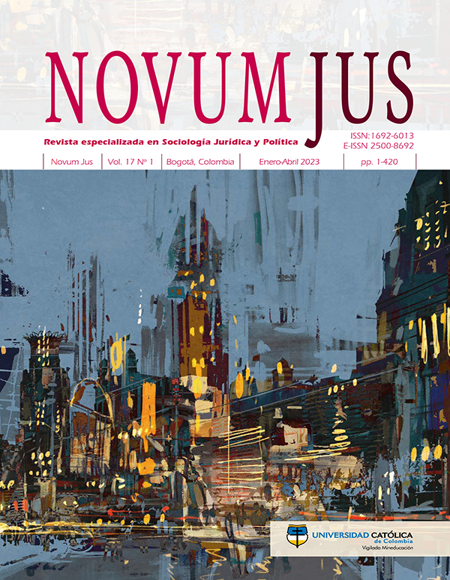
Este trabalho está licenciado sob uma licença Creative Commons Attribution-NonCommercial 4.0 International License.
Aquellos autores/as que tengan publicaciones con esta revista, aceptan los términos siguientes:
- Los autores/as conservarán sus derechos de autor y garantizarán a la revista el derecho de primera publicación de su obra, el cuál estará simultáneamente sujeto a la Licencia de reconocimiento no comercial de Creative Commons que permite a terceros compartir la obra siempre que se indique su autor y su primera publicación esta revista.
- Los autores/as podrán adoptar otros acuerdos de licencia no exclusiva de distribución de la versión de la obra publicada (p. ej.: depositarla en un archivo telemático institucional o publicarla en un volumen monográfico) siempre que se indique la publicación inicial en esta revista.
- Se permite y recomienda a los autores/as difundir su obra a través de Internet (p. ej.: en archivos telemáticos institucionales o en su página web) antes y durante el proceso de envío, lo cual puede producir intercambios interesantes y aumentar las citas de la obra publicada. (Véase El efecto del acceso abierto).
Resumo
The purpose of this article is to enhance the measures to prevent criminal offenses against participants in criminal proceedings by clarifying the determinants of victimhood, highlighting the relevant typical features of victims. It was found that the victimhood of participants in criminal proceedings is characterized by a combination of personal behavioral qualities and special status, which interact with external factors and may be manifested simultaneously in a complex fashion and with different interpretations. Victim-forming factors of participants in criminal proceedings are singled out—a set of socio-psychological and biophysiological
properties, behavioral attitudes and personal characteristics, and external conditions. To develop effective
prevention measures, the main types of victims—participants in criminal proceedings—are identified: victims
involved in criminal proceedings (witness, victim, suspect (accused), defense counsel, legal representative, expert, specialist, etc.) and victims—professional participants in criminal proceedings (investigator, coroner,
prosecutor, judge, expert). The essence of professional victimhood is determined, which can be characterized by the absence of provocative manifestations, and the identification of the participants in criminal proceedings by the authorities, which causes in a certain category of persons the desire to come into conflict with them.
The factors that cause increased victimization are highlighted.

Referências
Agudelo Giraldo, Óscar Alexis, and Astrid Rocío Galán. “Derecho injusto. Fórmula de universalización y derechos humanos.” Novum Jus 9, No. 2 (2015): 111-136. https://doi.org/10.14718/NovumJus.2015.9.2.5.
Borodin, Stanislav. Fight Against Crime: A Theoretical Model of a Comprehensive Program. Moscow, 1990.
Brusnitsyn, Leonid. “Theoretical and Legal Bases and World Experience of Safety of the Persons Promoting Criminal Justice.” PhD diss., Moscow: dissertation of Dr. jurisdiction science. Moscow, 2002.
Galán Galindo, Astrid Rocío. “Los derechos humanos fundamentados mediante la legitimación y la moral jurídica.” Novum Jus 10, no. 1 (2016): 31-48. https://doi.org/10.14718/NovumJus.2016.10.1.2.222222
Golina, Volodymyr. UN Congresses on Crime Prevention and Criminal Justice: A Collection of Materials in 3 Books. Kyiv, 2013.
Golovkin, Bogdan. “Criminological Concept of Victimization.” Scientific Bulletin of the International Humanities University 2, no. 15 (2015).
Goncharuk, Natalia. Each Vinnytsia Investigator Investigates an Average of About 100-150 Criminal Proceedings: An Interview with Yuri Pedos. July 3, 2014 http://mvs.gov.ua/mvs/control/vinnytsia/uk/publish/article/141163 (accessed May 7, 2022).
Kikot, Vladimir and Aleksandr Stolyarenko. Applied Legal Pedagogy in Law Enforcement: A Textbook for Cadets and Students Educated. Moscow: UNITI-DANA, 2008.
Kulakova, Natalia. “Current Issues of Criminological Policy in Ukraine.” On the Occasion of the 35th Anniversary of the Department of Criminology and Criminal Enforcement Law of the National Academy of Internal Affairs Proceedings of the Interuniversity Scientific-Theoretical Conference (April 25, 2012). Kyiv: National Academy of Internal Affairs, 2012.
Leal Esper, Yamal Elías. “Las directivas anticipadas: reflexiones jurídicas en el sistema legal colombiano.”Novum Jus 14, no. 2 (2020): 307-330.https://doi.org/10.14718/10.14718/NovumJus.2020.14.2.13.
Lytvynov, Oleksij. “Socio-legal Mechanism of Crime Prevention in Ukraine (Theoretical and Practical Principles”. Phd diss., Kharkiv, 2010.
Maile, Aleksej. “The Rights of the Police of Russia and Germany: Similarities and Differences”. In Police - A New Institution of the Modern State Law Enforcement System: Materials of the All-Russian Scientific-Practical Conference (September 15-16, 2011). Omsk: Omsk Academy of the Ministry of Internal Affairs of Russia, 2012.
Maistrenko, Mariia, Kira Gorelkina, and Yevdokiia Buzhdynanchuk. “International and National Mechanisms for the Protection of the Rights of Victims of Armed Conflict in Eastern Ukraine.” Novum Jus 15 [Número Especial] (2021): 17-41. https://doi.org/10.14718/NovumJus.2021.15.E.2.
Mayorov, Aleksandr. “Conceptual Bases of Victimological Counteraction to Crime.” Monograph, Chelyabinsk, 2013.
Polubinsky, Vladimir. Legal Bases of the Doctrine of the Victim of a Crime. Gorky: USSR Ministry of Internal Affairs, 1972.
Rivman, David and Vladimir Ustinov. “Victimology.” Monograph, N. Novgorod, 1998. Schneider, Hans. Criminology. Moscow: Progress, 1994.
Verkhovna Rada of Ukraine. On Ensuring the Security of Persons Participating in Criminal Proceedings. Law of Ukraine of December 23, 1993. Nº3782-XII. https://zakon.rada.gov.ua/laws/show/3782-12 (accessed May 7, 2022).


















